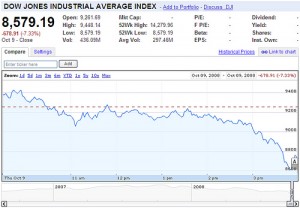 Picking the right investment can be a lot of work. There are companies to research, past performance to evaluate, expenses to analyze, and a lot of other steps that many people simply do not have the time or desire to do. Rather than spend a lot of time trying to find the perfect investment, a good number of people will simply choose to use index funds. There is no reason to waste time trying to learn a whole new skill set. Rather pick something that works, and stick with it.
Picking the right investment can be a lot of work. There are companies to research, past performance to evaluate, expenses to analyze, and a lot of other steps that many people simply do not have the time or desire to do. Rather than spend a lot of time trying to find the perfect investment, a good number of people will simply choose to use index funds. There is no reason to waste time trying to learn a whole new skill set. Rather pick something that works, and stick with it.
When people hear about the stock market, their minds usually go to one of the three major indexes in the United States, the Dow Jones index, S&P 500 index or the NASDAQ. Since you cannot invest directly into an index, many different mutual fund families, such as Vanguard, have developed index funds. These funds will track the index, mirroring their performance. They are non-managed, so the underlying investments in these funds do not get changed and switched because a manager thinks something else will do better than something else. Instead the investor knows what they get, and they will always get that same thing.
When figuring out a portfolio the first thing an investor does is determine his or her risk tolerance. That will give the guidelines as to which funds should be used. Then, he or she can pick domestic stock index funds, overseas index funds, or bond market index funds. They can put some money into each one in order to obtain the desired risk in the portfolio. This can be done in a personal IRA, or an employer plan. Most retirement savings vehicles will offer index funds as an option.
The biggest advantage of an index fund is that they have extremely low fees. Not needing a manager the fund family can offer these investments with no sales charge, and very low ongoing expenses. Since the funds track the index, the investor will always know what he or she is getting, and even without looking at their particular portfolio they can often know what their investments did based on hearing about the index throughout the day. The funds are simple to understand and easy to use.
While no fund manager provides the biggest advantage, it also provides the biggest disadvantage. There are some funds that have excellent managers. Those managers know what to do and will often outperform the benchmarks. An index fund, on the other hand, can only hope to perform slightly under the index it tracks.
Index funds are a great choice for those who do not want to take the time to research other investments. Instead of trying to choose the right fund and make sure their money is going to the right place, dropping it into a low fee index fund is easy. There is no need to worry about sales charges and low internal expenses will not eat up returns. Unfortunately the ease of use is often a trap that many people fall into. They feel that there is no reason for the higher fees charged by other funds and sometimes miss out on better performance elsewhere. Index funds have their place and are a great option for many people. But like with all investments, they are not suited for all portfolios.
Did you enjoy this article? If so sign up for our daily newsletter so you can stay on top of every personal finance topic we cover. Also check us out of Facebook, Twitter and Google+.

I like your caveat at the end. Anyone who blindly indexes with all of their money ignores the fact that one day they’ll have to remove fund, which might be on a day they’d regret not having money in a suitable position instead of the “hip” spot. Not that I hate index funds and ETFs….love them in fact. But your caveat at the end is an important one.
Nice post. Index funds really can save some time. I really look for low cost funds, so as to not eat up too much of my money. Great point on them not being for everyone…doing your research is key!
I read an interesting book called the “The Big Secret” that argued not only for index funds, but that over the long haul actively managed funds could not do any better than an Index Fund. And because of the low fees, that margin made them better over the active ones.
Hello, thanks for contributing this post to the Carnival of Investing! This week’s carnival is now up on our website.